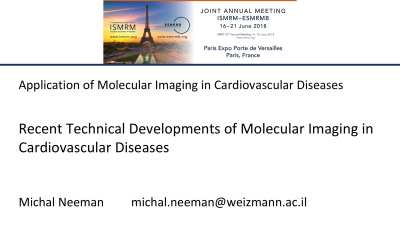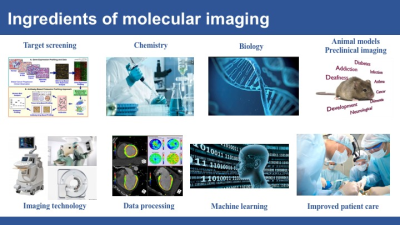|
Sunrise Session
Application of Molecular Imaging in Cardiovascular Diseases |
|
Application of Molecular Imaging in Cardiovascular Diseases
Sunrise Session
ORGANIZERS: Guanshu Liu, Natalie Serkova, Damian Tyler
Tuesday, 19 June 2018
| S03 |
07:00 - 07:50 |
Moderators: Fabao Gao, Damian Tyler |
Skill Level: Basic to Intermediate
Session Number: S-Tu-05
Overview
This sunrise session will comprise four courses. Each of them will dedicated for preclinical and followed by clinical application of molecular imaging in following areas: cancer, cardiovascular, neuro, and body imaging.
Target Audience
Physicians, imaging scientists/engineers, technologists, and other health professionals who are interested in performing MR molecular imaging in particular disease areas.
Educational Objectives
As a result of attending this course, participants should be able to:
-Describe current technical developments of molecular imaging in cardiovascular diseases;
-Explain how to conduct state-of-the-art preclinical studies with novel imaging approaches and tracers; and
-Discuss how to translate molecular imaging protocols to clinical trials.
07:00
|
 |
 Recent Technical Developments of Molecular Imaging in Cardiovascular Diseases Recent Technical Developments of Molecular Imaging in Cardiovascular Diseases
Michal Neeman
Cardiovascular disease (CVD) is the leading cause of death, despite significant progress in identification of risk factors and preventive, as well as interventional therapy. Non invasive molecular imaging offers promise of advancing the research of the progression of this disease and eventually could impact patient care. Some of the underlying changes that occur during CVD can be detected by MRI, including changes in inflammation, involvement of macrophages and deposition of collagen during scar formation. Molecular probes can be targeted towards ECM or cell surface markers. Endogenous contrast can be used for detection of collagen deposition and vessel permeability, and reporter genes can be used for tracking tissue remodeling and stem cell regenerative therapy. Recent breakthroughs in evaluation of the control of cell cycle arrest in the heart may open new paths for enabling cardiac repair.
|
07:25
|
 |
 Clinical Translation & Applications of Molecular MRI in Cardiovascular Diseases Clinical Translation & Applications of Molecular MRI in Cardiovascular Diseases
René Botnar
Molecular magnetic resonance imaging (MRI) is a promising tool to detect molecular and cellular changes in the carotid, aortic and coronary vessel wall including endothelial dysfunction, inflammation, vascular remodelling, enzymatic activity, intraplaque haemorrhage and fibrin deposition and thus may allow early detection of unstable lesions and improve the prediction of future coronary events. To increase the biological information obtained by MRI a variety of targeted-specific molecular probes have been developed for the non-invasive visualisation of particular biological processes at the molecular and cellular level. This presentation will discuss recent advances in molecular MRI of atherosclerosis, covering both pulse sequence development and also the design of novel contrast agents, for imaging atherosclerotic disease in vivo.
|
07:50
|
|
Adjournment & Meet the Teachers |
|
| Back |
| The International Society for Magnetic Resonance in Medicine is accredited by the Accreditation Council for Continuing Medical Education to provide continuing medical education for physicians. |



